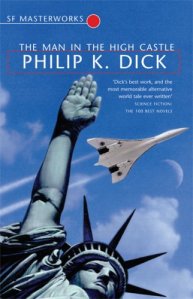Is Europe welcoming desperate refugees, or being invaded by economic migrants? Is Donald Trump a serious President, or a clownish attention seeker? The Man In The High Castle reveals the most basic truths about our era of competing narratives.
*
In 1947 the forces of Nazi Germany and Imperial Japan swept to victory over Europe and America. Fifteen years later America still lives under Axis dominance. This is the starting premise of Philip K Dick’s 1962 science fiction masterpiece, The Man In The High Castle, which recently become the latest of the famed sci-fi author’s stories to be adapted for the screen.
It’s often claimed that The Man In The High Castle is a novel of alternate history. While it’s true that the story contains a fascinating counterfactual timeline of the world following an Allied defeat, theres an even deeper level of significance within Philip K Dick’s classic novel. The Man In The High Castle is a novel not just of alternate histories, but of alternate narratives, and it’s in this contest of narratives that the novel says most about the politics of today.
“We, like the characters reading The Grasshopper Lies Heavy, must question the narrative of our own reality.”
Subscribe to the Science Fiction podcast
Insights and interviews on the art and craft of 21st century myth making.


The Grasshopper Lies Heavy is a story within a story, a novel within the novel of The Man In The High Castle. This secondary book imagines a world where the Axis powers *lost* World War 2, a world uncomfortably close to our actual reality. Even while we as readers follow the story of Germany and Japan winning the war, PKD engineers a counter narrative in which, as with our actual reality, those nations lost the war. And as the story progresses, these two alternate narratives begin to conflict.
The author of The Grasshopper Lies Heavy, Hawthorne Abendsen, is the eponymous “man in the high castle”. He lives in an isolated mountain compound, to which a number of the novel’s central characters are drawn by reading the novel within the novel. As they do, reality itself begins to shift and alter, and they begin to enter the world of Abendsen’s book. The resemblance between Abendsen and Philip K Dick is deliberate. PKD is suggesting that we, like the characters reading The Grasshopper Lies Heavy, must question the narrative of our own reality.
Confused? Perhaps no more so than we all are by the conflicting narratives of everyday life. Today our world is saturated with narratives. Newspapers, television, advertising and the internet are continually bombarding us with stories of society, politics, wars, technology and thousands of other subjects. PKDs fascination with this complex web of narratives lead him to repeatedly ask the question in fiction that confronts us all today in reality – which narratives are we, ultimately, to believe?
“The false narratives of others are easily spotted, but we’re almost entirely blind to false information that supports our own narrative.”
Is Europe welcoming desperate refugees, or being invaded by economic migrants? Is Donald Trump a serious presidential candidate, or a clownish attention seeker? Are cuts to public spending a necessary economic sacrifice, or is economic recession just an excuse to force through ideology? These hot button issues don’t simply divide culture, they reveal the competing narratives fighting for dominance of culture.
Conservatives and liberals who take opposing positions on these issues don’t just hold different opinions, they believe radically different narratives. The conservative narrative, that believes in God the creator and religious law, leads people to very different conclusions on major issues, than the liberal narrative of evolution and scientific discovery. What Philip K Dick understood in 1962, that most of us today are only beginning to see, is just how our narratives define our sense of reality. While we may live in one world physically, we inhabit very different worlds psychologically.
Social media means that more people than ever can create narratives and put them into the world. The website Snopes.com catalogues, and debunks, the complex half truths, conspiracy theories and outright lies that proliferate on the internet. Taken in isolation the mistaken belief that Starbucks removed Jesus from their Christmas cups, or that Steve Jobs recanted his capitalist ways on his death bed, seem simply absurd. The false narratives of others are easily spotted, but we’re almost entirely blind to false information that supports our own narrative.

With The Man In The High Castle, Philip K Dick was pointing to one of the great conundrums of modern life and culture. When we attempt to judge competing narratives as true or false, we inevitably do so in relation to the narratives we already hold to be true. PKD asks us to imagine a world where Nazi power triumphed in WW2, and a world in which the narrative of history was written by the victor. If we lived in that world, how would we know that the lies spun by a Nazi government were not the truth? If even a power as malignant and destructive as Nazism could persuade us to believe its narratives, then anything we believe true might potentially be based upon lies.
The answer Philip K Dick guides us towards is an awareness of narratives themselves. Until we see how stories are used to shape our perceptions and reality, we’re vulnerable to continued manipulation. But once we can think critically about the ways that narratives are constructed, and the various agendas they serve, we can begin to assess objectively our own beliefs. That simple insight places The Man In The High Castle among the best guides to our 21st century world, and is the reason why the works of Philip K Dick are read so widely some fifty years after they were written.
Learn more about the complexities of storytelling and find out why Neuromancer is still the greatest SF novel. Follow all my writing as a patron.
Follow me on Twitter @damiengwalter.

Interesting article and good points. The ideology seems to come first and the organisations (political parties, owned media companies, billionaires) seem to use media to support and justify their own positions and actions. Truth is often the first casualty. Hence our own frame of perception / reality is a maze, unless we glaze over and believe one party line or another. It is like Big Brother style manipulation. PKD was a master of exploring these topics and I agree, they are hugely relevant today.
LikeLiked by 1 person
Nice piece. I have been a fan of PKD since 1972 when I read The Penultimate Truth.
LikeLiked by 1 person
I found his short stories after watching Total Recall. So the films aren’t ALL bad.
LikeLike
“Conservatives and liberals who take opposing positions on these issues don’t just hold different opinions, they believe radically different narratives. The conservative narrative, that believes in God the creator and religious law, leads people to very different conclusions on major issues, than the liberal narrative of evolution and scientific discovery.”
WTF? How do you turn hippies versus rationalists into science versus religious law? The Chicago Economic School versus Marx and Engels into religion versus scientific discovery? Certainly the religion here is the belief in an idyllic future of people who act against their best interests for the good of a group with no genetic relation. The finest scientist I know are conservatives. They won’t plunge into social experimentation without evidence or despite the evidence – the facts – of history. Who would do that but a fool who wont let reality interfere with lofty ideals? Would you say you have also described the Muslim narrative versus the narrative of reason?
LikeLike
Good to see you’re deeply embedded in your own narrative there Charles.
>
LikeLike
May I recommend Eric Hoffer’s essays on the nature of mass movements, “The True Believer”. It is very well written and I’m pretty sure it won’t disturb your own narrative. You might get an understanding of why there are people who strive to make decisions based on reason who disagree with you.
LikeLike
I am familiar with it. As you say, it does not disturb my narrative, although I think you misuderstad what my narrative is. What lesson are you hoping I will take from it?
>
LikeLike
“The conservative narrative, that believes in God the creator and religious law, leads people to very different conclusions on major issues, than the liberal narrative of evolution and scientific discovery.”
I don’t accept this simplistic dichotomy. It’s not a useful analysis. Conservative are often not religious. There are plenty of ‘liberals’ who don’t accept evolution, and think scientific discoveries are primarily just cultural perspectives. (“Show me a cultural relativist at 30,000 feet and I’ll show you a hypocrite” — Dawkins)
The true differences between so-called “conservatives”, who are often very radical at least in economics, and “liberals”, who are in reality quite conservative, are not discussed enough. The two terms have become corrupted.
LikeLike
I doubt even PKD could have predicted that a dictator in our former Cold War adversary would influence the U.S. presidential election, with the winner actually losing that election by 3 million votes and gushing over that dictator’s tactics. That’s PKD in its purest form, and now we all have to deal with this terrible reality being our actual reality, with nearly half the country accepting that the stories driven by fake news are real, and that only a strong man who literally and publicly advocates torture can “Make America Great Again.” I want to believe that PKD is just telling fiction. But the world around me is telling me, it’s not, and it’s troubling.
LikeLike
Actually that sounds exactly like PKD did predict it to me ;)
LikeLike